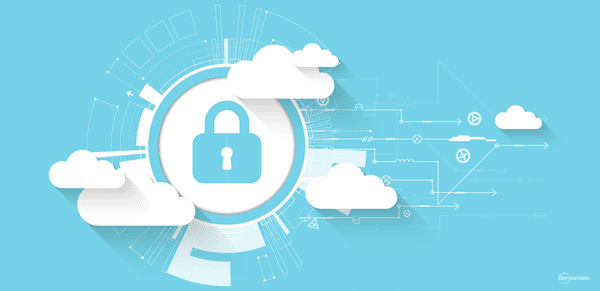
8 Ways to Increase Your Online Security
June 30, 2020
Data Center Strategies to Improve Your Business
July 3, 2020The COVID-19 pandemic has resulted in a significant rise in demand placed on IT departments. This is due to the fact that more and more companies move a part or all their operations to the cloud. There is an inevitable question about security that the companies have to ask, “Is our data safe in the cloud?”
IT teams are working day and night to make sure that the data is not vulnerable to cyber-attacks and that there are no issues with data safety.
What Is Cloud Security?

Credit: The Devolutions Blog
This refers to a set of control-based security features that provide multiple levels of technological protection intending to protect cloud-based resources from theft, leaking, and overall data loss.
Cloud security provides continuity and protection for both public and public assets e.g., websites and applications.
How Is Security in the Cloud-Managed?
The greatest threats to company data are malware and ransomware breaches. These are usually spread via emails, and once downloaded, the malicious software gets installed and starts stealing and damaging files. You can get rid of these threats by following a simple, clear, straight-to-the-point malware removal guide. Alternatively, you could use any anti-malware tool available in the market as well as other software tested programs to remove these threats. If all that sounds like too much to do, we recommend finding a cloud security provider:
If the right cloud security measures are put in place, it creates a conducive environment by providing customers with a scalable and flexible network solution. Cloud service providers use several methods to protect data stored in the cloud. These include:
Firewalls
Firewalls are a big part of cloud architecture. They form a protective perimeter around the network and offer security to the end-users. Firewalls also come in handy in safeguarding traffic between different apps stored in the cloud.
Threat Intelligence
This will identify and spot any security threat. The threats are ranked in order from the most critical to the least vital, and then this feature helps you protect your assets from these threats.
Data Masking
This method works by encrypting information that’s easily identifiable such as people’s names. This ensures that data integrity is maintained since the information is kept private.
Access Controls

Credit: Connector Supplier
These controls enable you to access your stored data for different people to different assets. For example, you could allow individual employees to access specific applications while denying access to other employees who don’t need those tools to do their job.
Restricting access keeps your important files safe from malicious people with ill motives.
Disaster Recovery
This recovery method is essential in ensuring that you don’t lose your data completely.
Cloud security providers also work to protect data that is in transit. Some data security methods that are used include VPNs, encryption, and masking.
What Are the Benefits of Cloud Security?
Security experts no longer see data stored in the cloud as being vulnerable. That’s why they do as much as possible to highlight its benefits because the value that companies get when they move to the cloud outweighs all the uncertainties.
Now that you have a rough understanding of how cloud computing works, it’s time to explore the benefits:
Data Security

Credit: Trend Micro
Security experts always do their best to prevent any data breach in the cloud. That explains why there’s a massive investment in access control, identity management, as well as antivirus and anti-malware protection.
Security protocols should always be in place to prevent third parties from hijacking communications between users and servers and protect sensitive information and transactions from being tampered with.
Unless they’re well protected, businesses can suffer massive data leaks and network-wide malware infections. Cloud security comes in with sophisticated tools to encrypt data to prevent cyber-attacks.
Flexibility
You’re guaranteed top-notch security, whether you need to scale up or need to turn down capacity. This allows you to turn up to avoid clashes when there’s high traffic and turn down when the high traffic is over, as a way of reducing costs.
High Availability and Support
Web assets are always on, and so they require monitoring 24 hours a day for all seven days of the week. Cloud security providers offer round-the-clock support to companies whenever they need it. Redundancies have become a necessity – these are built to ensure continuity of service and to make sure that the company’s data and applications are always online.
Cloud DDoS Protection
DDoS stands for Distributed Denial of Service. These attacks flood the system with requests which make the website load very slowly until it crashes when it cannot handle any more requests. Businesses know how such a situation would hurt them; every minute that the website is inaccessible, you lose money. A DDoS attack can render a website useless for hours or even days, and this would translate to huge losses in terms of cash and customer trust and brand authority.
Cloud DDoS protection ensures that websites don’t get overwhelmed so much that they cannot respond to genuine user requests. Protection entails monitoring, absorbing, and dispersing any potential DDoS risk to mitigate the attacks.
Regulatory Compliance
Conclusion
For many companies, security is a critical issue, especially when it comes to protecting their customer’s data. This explains why there is a need to have stable security policies in place to secure data stored in the cloud environment. But these days, the cloud is no longer as scary as once people saw it to be. Modern cloud services are secure, reliable, cost-effective, and highly reliable.
We have to keep in mind that as the web presence grows, people have to be prepared for an increase in more complex attacks. It is very important for companies to identify all potential risks for data stored in the cloud and develop robust protection solutions.
